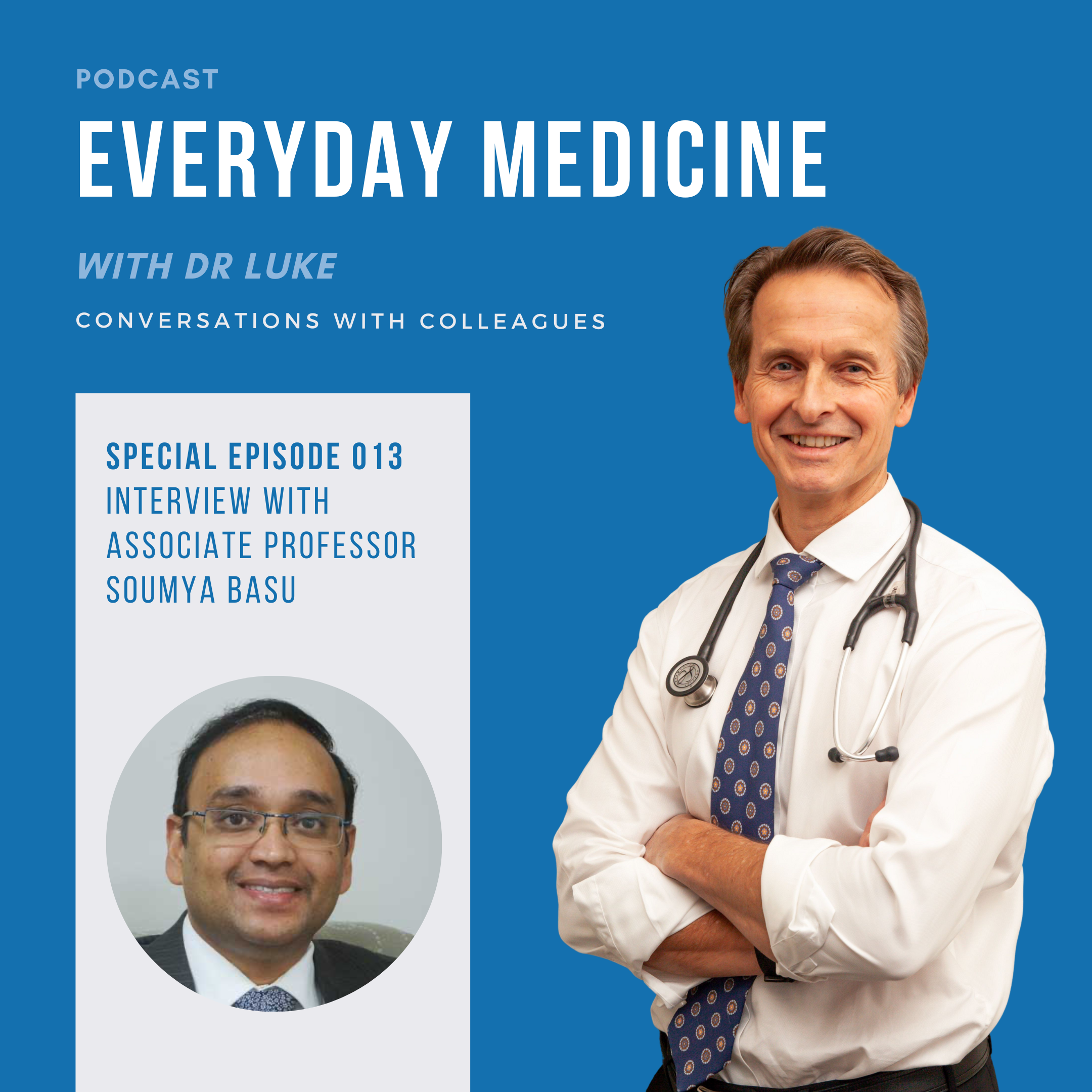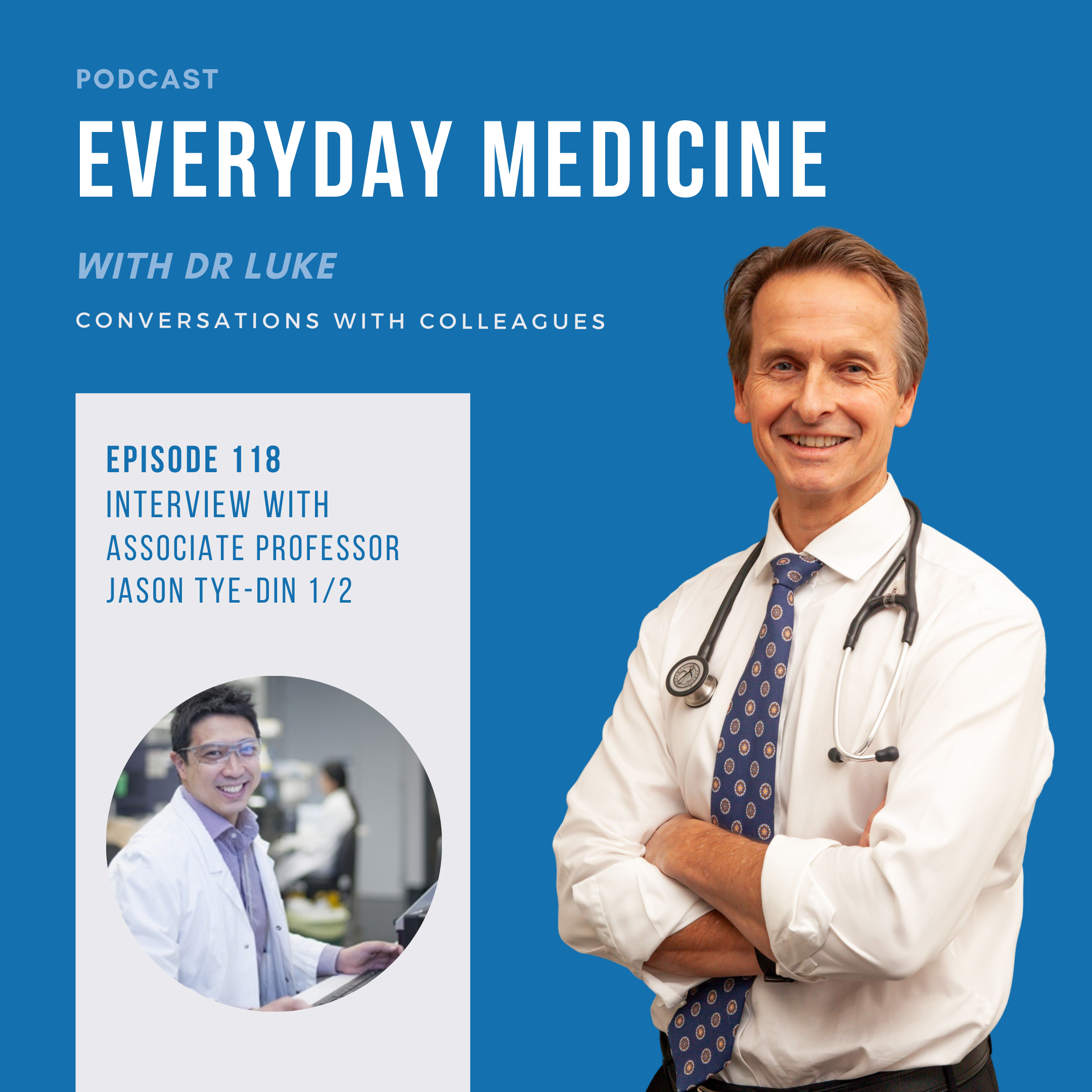Everyday Medicine by Dr Luke Crantock
Conversations with colleagues providing helpful ideas and advice in healthcare
Episode 128. Chronic Leukaemia with Jake Shortt
Leukemias are malignant progressive disease in which the bone marrow and other blood-forming organs produce increased numbers of immature or abnormal leucocytes. This is thought to occur after somatically acquired genetic mutations lead to dysregulation and clonal expansion of progenitor cells. Whilst most leukemias involve white blood cells, occasionally other cells are the primary leukemia cells such as red blood cells or platelets.
As disease progression occurs, suppression of normal blood cell production leads to anemia and cytopenia with a host of attendant symptoms and clinical consequences.
Episode 127. Acute Leukaemia with Jake Shortt
Leukemias are malignant progressive disease in which the bone marrow and other blood-forming organs produce increased numbers of immature or abnormal leucocytes. This is thought to occur after somatically acquired genetic mutations lead to dysregulation and clonal expansion of progenitor cells. Whilst most leukemias involve white blood cells, occasionally other cells are the primary leukemia cells such as red blood cells or platelets.
As disease progression occurs, suppression of normal blood cell production leads to anemia and cytopenia with a host of attendant symptoms and clinical consequences.
There are 14 new diagnoses of Leukaemia per day in Australia accounting for about 5200 diagnoses yearly and making up about 3.2 % of all new cancer diagnoses per year. Leukaemia is responsible for over 2100 deaths annually. Men are slightly more likely to be affected in a 60: 40 split with women. By the age of 85 years, one has a 1: 50 chance of this diagnosis. With current treatment approaches overall 5-year survival sits at about 64 % but this figure is influenced by the subtype of Leukaemia diagnosed with aggressive forms of Leukaemia such as AML carrying a much worse prognosis than a diagnosis such as CLL which may run an indolent course for many years.
Dividing adult Leukaemia into acute and chronic classification is most helpful and this podcast will approach the topic similarly over two episodes.
The acute Leukaemias encompass acute myeloid leukemia (30 % of adult Leukaemia), acute lymphoblastic Leukaemia and Leukaemia's of ambiguous origin.
The chronic Leukaemias include Chronic Myeloid Leukaemia (CML) and Chronic lymphocytic leukemia (CLL)
This is another vast subject, and it was a real honour to invite Professor Jake Shortt to the podcast. Jake is the Head of Haematology Research at the School of Clinical Sciences and clinical lead at Monash Haematology for Myeloid Leukaemia, myelodysplasia and T-cell lymphoma. He is the Principal Investigator on a range of clinical trials for T-cell lymphoma and myeloid malignancies, conducted through the Monash Haematology clinical trials unit and the recipient of a Medical Research Future Fund Career Development Fellowship. His work in the School of Clinical Sciences is focused on strategies incorporating epigenetic drugs with immunotherapy in haematological cancers, particularly Lymphoma and Multiple Myeloma. Jake heads the Blood Cancer Therapeutics laboratory within the Monash Health Translation Precinct and somehow also finds the time to be Chair of the Laboratory Sciences Working Party of the Australasian Leukaemia and Lymphoma Group (ALLG) and Deputy Chair of their Scientific Advisory Committee.
Please welcome Professor Jake Shortt to the podcast.
References :
Haematology and Oncology Subspecialty Consult, 4th Ed, Cashen and Van Tine, Wolters Kluwer, Ch 31
www.leukaemia.org.au
www.cancer.org.au
www.monashhealth.org/services/haematology/jake-shortt/
Episode 124. Lipids and Atherosclerotic Cardiovascular Disease with Dr Brett Forge (Part 3/3)
Lipids are essential for cell function and healthy metabolism however clinical analysis of a patient’s lipid profile also addresses one of the fundamental drivers of atherosclerotic cardiovascular disease responsible for 25 % of all deaths in Australia. Modification of abnormal serum lipid levels by lifestyle and pharmacologic intervention aims to achieve a healthy coronary circulation reducing new atheroma formation and stabilizing preexisting atheromatous plaques.
Episode 112. Sweet Poison: Why Sugar Makes Us Fat with David Gillespie
Sweet poison was first published in 2008 and is probably more relevant now than when David first wrote it. The book contains a great deal of well-researched information and would be a good recommendation to patients eager to learn how a relatively simple dietary choice may turn around emerging health issues.
Episode 111. Stereotactic radiotherapy and the Abscopal Effect with Dr Marcus Foo
In an earlier episode, we reviewed the principles of radiation therapy from a general perspective. This field of medicine unifies the management of cancer, by harnessing the therapeutic benefits of radiation, utilising ionising radiation. A specific form of this treatment is stereotactic radiotherapy, which administers radiotherapy from different angles around the body, with the focus of ionisation meeting at the targeted tumour to be treated. This allows the focussed delivery of high-dose radiation to the tumour, whilst nearby tissues receive a much lower and thus less damaging dose - lowering the risk of side effects.




















